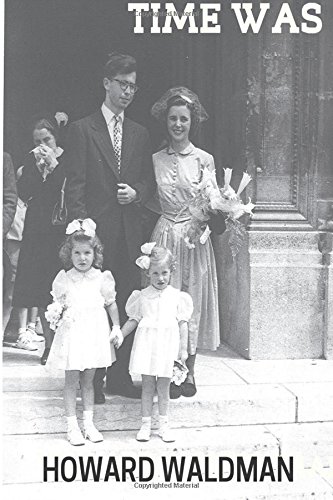 Reviewed by Magdalena Ball
Reviewed by Magdalena Ball
Time Was:
Expat in Time and Space
By Howard Waldman
CreateSpace
Paperback: 186 pages, ISBN-13: 978-1533438768
If there’s a slight belligerence in Howard Waldman’s memoir Time Was it’s understandable. Waldman is an exceptional novelist whose work has been mostly ignored, even by his own family, who tends to read mostly in French. His memoir is not only very well-written, as one would expect from the author of Good Americans Go to Paris When They Die and The Seventh Candidate, but also lots of fun to read. There’s a kind of wry, slightly acerbic humor here that makes these vignettes particularly enjoyable. One gets a very strong sense of Waldman the character: a man who has stubbornly held onto his New York cultural roots, even after decades living in France, grappling with the language, in-laws, boars (and bores), and putting down new roots.
Waldman’s tale is one that will appeal especially to others who have found themselves in that permanent state of exile – one that continues to inform his work, and provide a context to the state of being in ‘transition’. There are plenty of linguistic puns and reflections on the nature of language peppered through the book. There are also many quite funny passages detailing his early attempts to pick up girls in France, his attempts to fit into British society while working for the Embassy, on the nature of French food, French gardening, French animals, and more. The book is self-referential – as autobiographies often are — but this one particularly so as Waldman explores the difficulties of gaining attention for his work, his struggles with becoming a writer, his feelings about music, his father-in-law’s cod liver oil fixation, his parents, and always the influences of other books on him. Books form a backdrop to the work:
I recall being plunged so intensely in King Lear in the subway that I shot past my 72nd Street station and emerged from Shakespeare’s lightning-blasted heath to the reality of a dingy terminal station in deepest Brooklyn. (74)
Waldman cites a number of passages from his own fiction oeuvre throughout the text, and also covers his Trotsky period, his feelings about cats (more positive than his feelings about dogs which are hilariously negative), his roses, rabbit problems, and his many trips around France, including a little country place in Rigaudie that became his second home and whose distance now represents a kind of Ithaca to which he cannot return due to old age. Though there’s certainly a melancholy in aging which is part of what makes this otherwise funny account moving, the most powerful parts of the book are the two key losses which become bookends of grief – Waldman’s father, and above all else, the sudden and tragic loss of his son Frances. Waldman nearly skirts around these losses, revealing the details in tiny fragments amidst the much lighter passages, as if it were too big, too terrible to go there, but the grief suffuses the text:
If I were a believer, my notion of heaven would be to materialize out of nothing and push open the gate, not pearly but mundane wood, with non-angelic choirs of blackbirds celebrating the late spring.
I see them through the bluish haze of the barbecue where they sit at the green table, all of them. Now they see me and yell for me to join them and I do…The day terminates with petanque and embracing Francis at our triumph, a triumph of a cyclic eternity of joy. (59-60)
Time Was is not your usual birth to death autobiography. Waldman’s haphazard style is unique and somehow manages to be both lighthearted and dark at the same time, but these vignettes have an otherworldly quality about them. The subtitle is appropriate as the disconnected voice of the narrator is not only out of time and out of place, it is one that invites the reader into that liminal space.